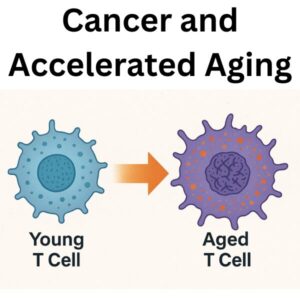Recent research highlights that aging and obesity each independently promote cancer progression and can act synergistically to worsen outcomes. However, weight loss appears capable of rejuvenating immune function and suppressing tumor growth. This article summarizes the findings of a new study and organizes the latest scientific insights on the interplay between cancer, obesity, and aging.
1. Mechanisms Linking Aging, Obesity, and Cancer
Aging increases cancer risk through genomic instability and immune senescence, while obesity promotes chronic inflammation, hormonal imbalance, and immunosuppression. Together, they amplify tumor progression.
2. Key Findings from UNC Research (2025)
In mouse models, aging and obesity synergistically accelerated triple-negative breast cancer (TNBC) growth. Immune-related gene signatures were suppressed but restored by intermittent calorie restriction (ICR), leading to significant tumor reduction.
3. Obesity and Cancer — A Global Concern
Obesity is a risk factor for more than 13 cancers, including postmenopausal breast, colorectal, and liver cancer. Adipose tissue–derived cytokines and hormonal shifts play central roles in tumor promotion.
4. Aging and Cancer — Immunosenescence and Microenvironment Changes
With age, immune surveillance weakens, T-cell function declines, and senescent fibroblasts release SASP factors that foster tumor growth. These age-related changes undermine antitumor immunity.
5. Synergistic Effects of Aging and Obesity
The study demonstrated that aged obese mice exhibited the fastest tumor progression and the strongest suppression of immune gene signatures. Clinically, this reflects high-risk elderly obese patients.
6. Potential of Weight Loss Interventions
ICR, chronic calorie restriction, and bariatric surgery each improved immune-related pathways. Clinical studies confirm that sustained weight loss reduces the incidence of obesity-associated cancers.
7. Future Perspectives
Targeting the intersection of cancer, obesity, and aging requires safe and sustainable weight loss interventions, particularly for elderly obese individuals. Combining weight loss strategies with immunotherapy may be a promising approach.
Conclusion
Aging and obesity are key drivers of cancer progression, especially when combined. Weight loss has the potential to rejuvenate immune function and suppress tumor growth. Translating these findings into clinical strategies is the next frontier in cancer prevention and therapy.
Related articles
This article was edited by the Morningglorysciences team.









Comments